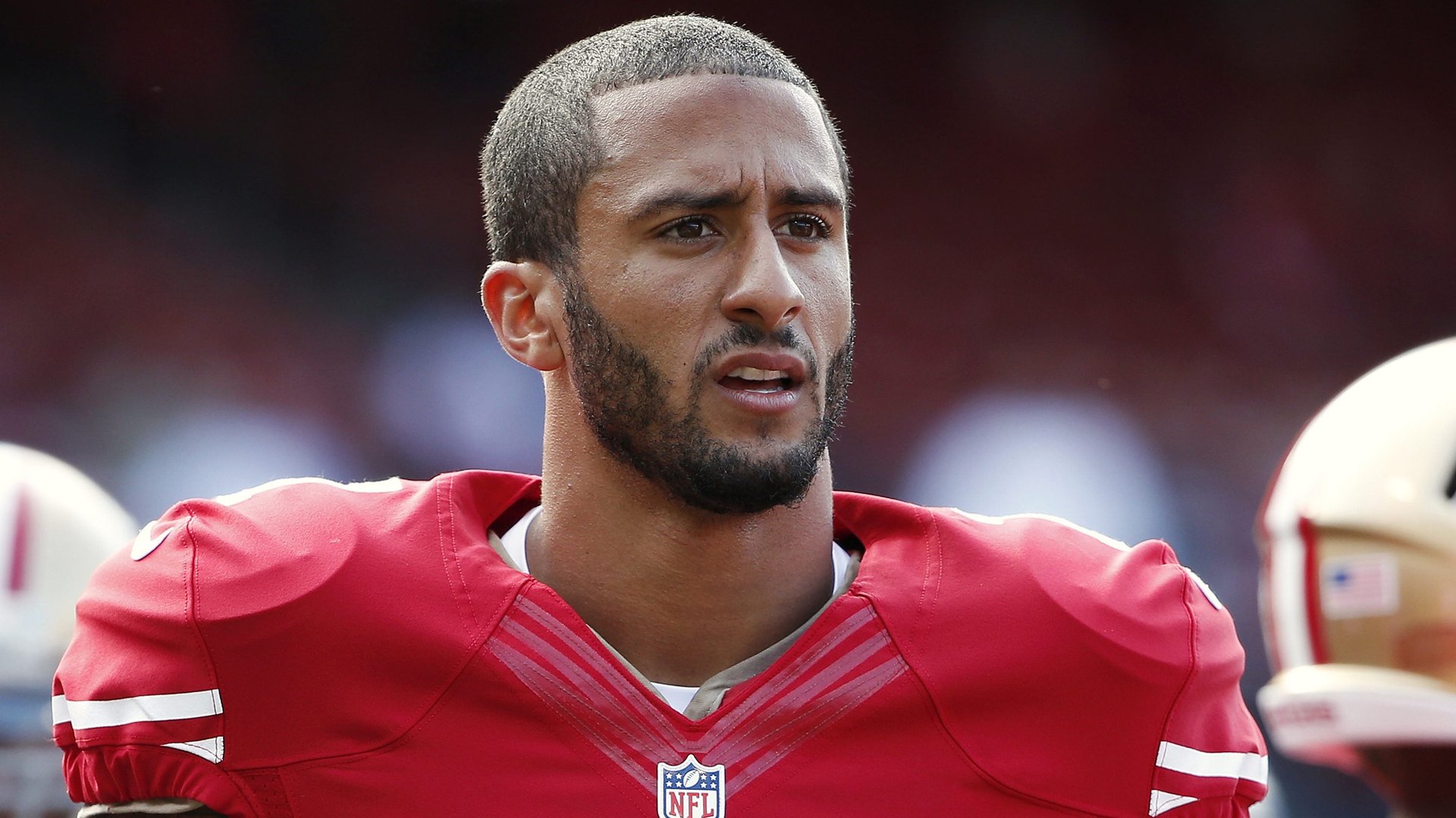Colin Kaepernick is the latest proof that American football is suddenly getting more political
Being a star in the NFL does not protect you from being a black man in the United States. With more instances of police brutality against African-American men coming to light in recent years—and officers often going unpunished—more NFL players are speaking up about social issues.


Being a star in the NFL does not protect you from being a black man in the United States. With more instances of police brutality against African-American men coming to light in recent years—and officers often going unpunished—more NFL players are speaking up about social issues.
The latest example is Colin Kaepernick, a quarterback for the San Francisco 49ers. Kaepernick declined to stand for the national anthem before a home preseason game against the Green Bay Packers on Aug. 26.
After the game he explained his action:
I am not going to stand up to show pride in a flag for a country that oppresses black people and people of color. To me, this is bigger than football and it would be selfish on my part to look the other way. There are bodies in the street and people getting paid leave and getting away with murder. …
This is not something that I am going to run by anybody. I am not looking for approval. I have to stand up for people that are oppressed. … If they take football away, my endorsements from me, I know that I stood up for what is right.
Some detractors interpreted Kaepernick’s move as showing disrespect toward US military personnel who make sacrifices for the nation. As a result, the debate that followed felt a bit disjointed at times. Alex Boone, a former teammate of Kaepernick’s now playing for the Minnesota Vikings, expressed anger over the quarterback’s action:
It’s hard for me, because my brother was a Marine, and he lost a lot of friends over there. That flag obviously gives (Kaepernick) the right to do whatever he wants. I understand it. At the same time, you should have some (expletive) respect for people who served, especially people that lost their life to protect our freedom.
Kaepernick does appear to have given careful consideration to his stance, and said he is prepared to take any financial hit that might come from lost endorsements:
Kaepernick isn’t alone. In recent years more NFL players have been speaking up about the inequality they see, and about the right of athletes to step outside the roles they play on the field. In 2014 Cleveland Browns player Johnson Bademosi wore an “I Can’t Breathe” T-shirt during practice, referencing the words of Eric Garner, an unarmed black man who died following a white police officer’s chokehold.
Bademosi wrote for Sports Illustrated:
When athletes step into the social sphere and express opinions on issues outside of sports, we’re often met with one of two reactions. The majority of people thank us for peeling back the curtain on identities shrouded by uniforms. A small minority of people respond with what amounts to, “Shut up and play”… Some support us as players but not as men. That the league is predominantly African-American helps explain why. I’m happy to say I don’t want you as a fan if that’s how you think.
Baltimore Ravens tight end Benjamin Watson has written about the Black Lives Matter movement in the 2015 book Under Our Skin. A Facebook post he penned on the topic last month generated 3,850 shares and 740 comments.
NFL commissioner Roger Goodell has not made a public statement about Kaepernick’s action, and it’s unclear whether he will. The league encourages but doesn’t require players to stand up during the anthem. 49ers coach Chip Kelly has said of Kaepernick, “We recognize his right to express his feelings.”
Though more NFL players are speaking out, some say it’s still too rare in the league. Seattle Seahawks defensive star Michael Bennett says NBA stars, including LeBron James, tend to speak out more. One reason, he said, is that guaranteed contracts are more common in the NBA than in the NFL, where the high risk of injury makes players more vulnerable and means shorter careers overall. Get sidelined by an injury as a mid-tier NFL player and you might not be coming back.
Wrote Bademosi:
Team culture tells you shut up, follow the crowd and do your job. Anyone who steps away from that standard runs the risk of upsetting someone who may control your means for providing for your family.
It’s all the more notable, then, when NFL players do speak up.